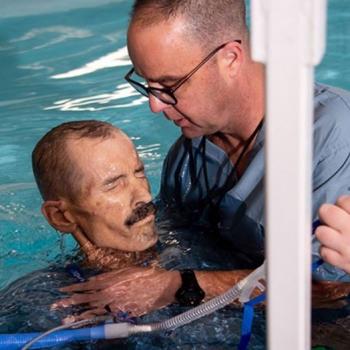On his Facebook page, Father James Martin, S.J., offers a snippet from his forthcoming book about Jesus:
Why does Jesus feel the need to be baptized? Let’s see what the Gospels have to say.
In Mark’s Gospel, he simply does it–sans explanation. Jesus “came from Nazareth in Galilee” and, upon his baptism, he saw the heavens “torn apart” and the Holy Spirit descending upon him “like a dove.” A voice from heaven says, “You are my Son, the beloved, with you I am well pleased.” Mark’s story is told from Jesus’s perspective: he sees these things, though we’re not told explicitly if anyone else does.
Luke’s description is in parts more specific but in others more confusing. In his narrative Jesus is baptized and is praying with a crowd, when the heavens open and the Holy Spirit descends on his “in bodily form like a dove.” Again, the voice comes from heaven, presumably heard by all. But an oddity: John doesn’t seem to be on the scene. For in the in the previous passage, Luke says that John the Baptist has been imprisoned by Herod. So who did the baptizing? We’re not told.
The Gospel of John’s version features more storytelling. As in the Synoptics, John the Baptist assumes the subordinate role to the man who may have been his disciple. “I am not worthy to untie the thong of his sandal,” he says, something a slave would do for the master. When Jesus approaches him on the following day, John exclaims that Jesus is the “Lamb of God.” Despite John’s protestations of his subordination (“After me comes a man who ranks ahead of me because he was before me”) he does the baptism.
Or at least he seems to. We’re not told anything about the baptism itself, nor is there a any mention of Jesus stepping into the River. John describes the descent of the Spirit after the fact. “I saw the Spirit descending on him like a dove, and it remained on him.”
Only in Matthew is the big question raised. John the Baptist says bluntly: “I need to be baptized by you,” and do you come to me?”
And only in Matthew does Jesus provide an answer: “Let it be for now! For this is it fitting for us to fulfill all righteousness.”
What does Jesus mean? While some argue that it is a reference to the later tradition of Christian baptism or a fulfillment of the Old Testament, Jesus may simply be referring to the kind of life to which John’s disciples are pledging themselves, one “producing good fruit,” as John says earlier in Matthew. Notice John says nothing about Jesus’s sinlessness. Nor does Jesus. Jesus freely presents himself to be baptized by John, though he is sinless, and John freely baptizes him, though he feels unworthy to do so.
So perhaps Jesus has decided to publicly align himself with John’s ministry. He may also have wanted to perform a kind of public ritual to inaugurate his own ministry.
But there is another possibility, which is that Jesus has decided to enter even more deeply into the human condition. Though sinless, he participates in the ritual that others around him are doing as well. He participates in this movement of repentance and conversion not because he needs it, but because it aligns him with those around him, with those anticipating the reign of God—in other words, everyone. It’s an act of solidarity, a human act from the Son of God who casts his lot with the people of the time. It has less to do with his original sin, which he does not carry, than identifying with those who carry that sin, like George and I experienced at the Jordan. The divine is fully immersing himself, literally in this case, in our humanity.
There is also the sense that Jesus is “taking on” the sins of humanity. In his book on baptism “Everything is Sacred,” Thomas J. Scirghi, a Jesuit theologian, compares Jesus’s sense of sin to the shame that a parent might feel should their child be guilty of criminal behavior. There is no sin, but still the parent feels the suffering that was caused by their child. As Karl Barth wrote, perhaps no one was in greater need of baptism than Jesus because of this “bearing” of our sins.
In this act of radical identification with humanity, Jesus is publicly confirmed by God as his divine Son, in a public way. In his deep humility he is exalted. There is a parallel to his later crucifixion to: as he humbles himself in baptism and is rewarded with the confirmation of the voice; his humbling of himself at the crucifixion leads to resurrection.
Image: Baptism of Jesus by James Tissot












